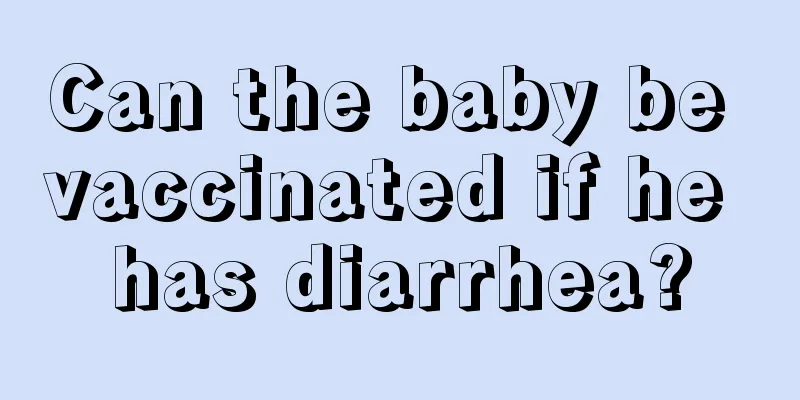Can the baby be vaccinated if he has diarrhea?

|
Friends who are parents all know that if the baby has a cold, fever, allergies or eczema before the vaccination, the vaccination cannot be given. The vaccination needs to be done one week after the baby has completely recovered. So if the baby has a little diarrhea, can he get a vaccination? Vaccination is very important for the baby, and it is especially critical to the baby's health. Experts remind that if your baby has mild diarrhea, it is best not to get vaccinated. 1. Can babies get vaccinations for diarrhea? Experts suggest that it is best not to give your baby vaccinations while he or she is suffering from diarrhea, as this is likely to aggravate the child's condition, which would not be worth the cost. Because the prerequisite for vaccination is that the child is in good health, otherwise it is easy to aggravate the condition. In addition, it is difficult to distinguish and judge the reaction results after the reaction occurs. It is not too late to vaccinate after the child has recovered. Simply put, if the baby does not have any other diseases while suffering from diarrhea, oral vaccines such as rotavirus vaccine should be given after the baby's diarrhea is cured. This is because the drug is excreted immediately after oral administration, and its effect on the body is too small, which means it is less effective or even ineffective. Then it depends on whether the child has short-term diarrhea or long-term diarrhea. Doctors generally recommend that the child be vaccinated after he or she recovers from the illness. What is advocated now is timely vaccination, but it is not recommended to get vaccination when you are sick. However, in certain special circumstances, such as when a virulent infectious disease is prevalent and has seriously threatened people's health, it is necessary to consider that the harm of the infectious disease is the primary, while the reaction of vaccination is secondary. The regulations on not giving vaccinations should be appropriately relaxed, but this should be decided by the doctor, not by the parents. Therefore, if the baby has diarrhea, parents should communicate with the doctor before making a decision if they want to give the child a vaccination. 2. How to prevent baby diarrhea First of all, to prevent your baby from diarrhea, the easiest way is to breastfeed your child. Because breast milk is easy to digest and contains immune cells and antibodies, babies who are breastfed are less likely to suffer from diarrhea. Even if diarrhea occurs, it rarely causes long-term chronic diarrhea. Secondly, developing good hygiene habits is also a preventive measure. Pay attention to the cleanliness of your hands and the disinfection of baby bottles. The brewed milk should not be left for too long to avoid the growth of bacteria. If you are starting to let your children take complementary foods, remember to follow the principle of starting with single items and small amounts. If your child already has diarrhea, don't worry. Just reduce your food intake appropriately and choose easily digestible foods. For example, babies can eat medical milk powder that has lactose, which is difficult to digest, removed. Older children can eat non-greasy porridge and steamed buns. Again, in terms of medication, for enteritis caused by bacteria, appropriate antibiotics can be selected according to the bacterial species. If it is viral enteritis, there is no special medicine and the baby's own immune system must be relied upon to overcome it. Precautions Don’t worry too much about your baby’s diarrhea problem. As a mother, as long as you take good care of your baby, your baby will be able to get through this period safely. Also, because the baby's skin is delicate, watery stools will irritate the skin and cause inflammation, so mothers should not forget to clean the baby's butt with warm water and keep it dry after the baby has diarrhea. |
<<: What's going on when a child has a fever, a hot head, and cold hands and feet?
>>: Precautions for babies taking anthelmintics
Recommend
Why does my child have bad breath when he wakes up in the morning?
Most of the time, babies have bad breath because ...
What to do if your 10-year-old child has trouble sleeping
Sleep determines whether the body is healthy. If ...
What to do if your baby has droopy eyelids
The healthy growth of children is something that ...
How to treat a baby who has not had a bowel movement for 2 days
When a baby doesn’t have a bowel movement for 2 d...
Baby's buttocks have pimples
Because babies do not have the ability to urinate...
What to do if your six-month-old baby has repeated fever
The baby's health is something that every par...
What to do if children's earwax becomes hard lumps
Earwax is usually in powder form and is easier to...
Why do babies sleep with their eyes open?
It is definitely a great joyous event for every f...
Nursing methods for children with upper respiratory tract infection
Many children will develop upper respiratory trac...
What are the dangers of girls holding urine for a long time?
Nowadays, the pressure of life and work is gettin...
What are the symptoms of acute sinusitis in babies?
Pediatric sinusitis is a type of pediatric nasal ...
What is the normal height for a twelve year old?
People attach great importance to height, especia...
What are the precautions for children to take anthelmintics?
Children often have stomach problems and cannot g...
Children's hair style
I have a beautiful little girl at home. As a moth...
What to do if your newborn baby fails hearing screening
With the advancement of medical technology, many ...









